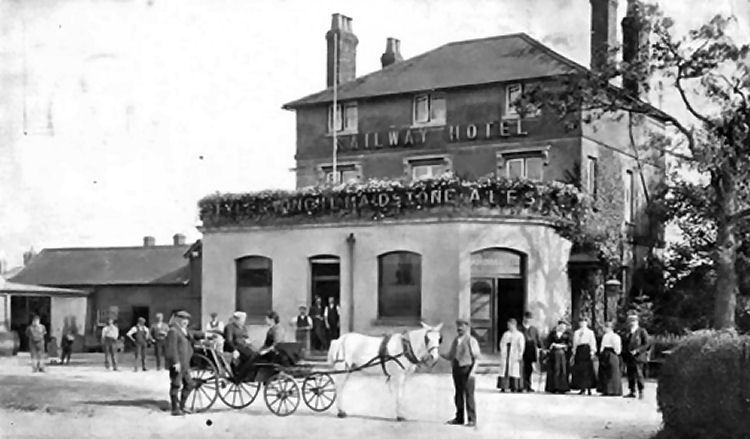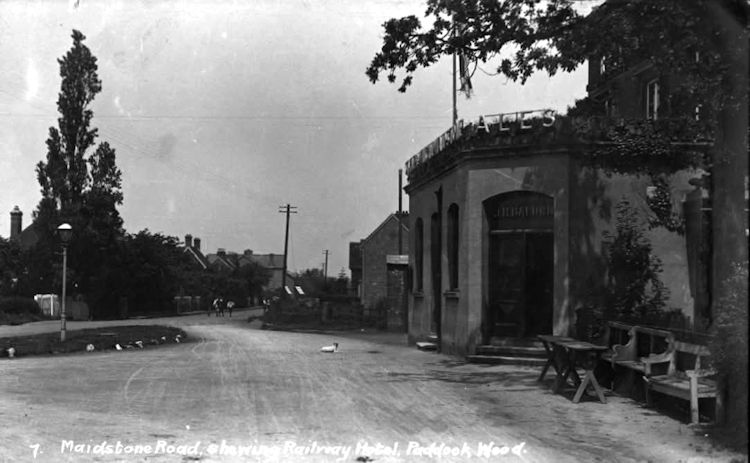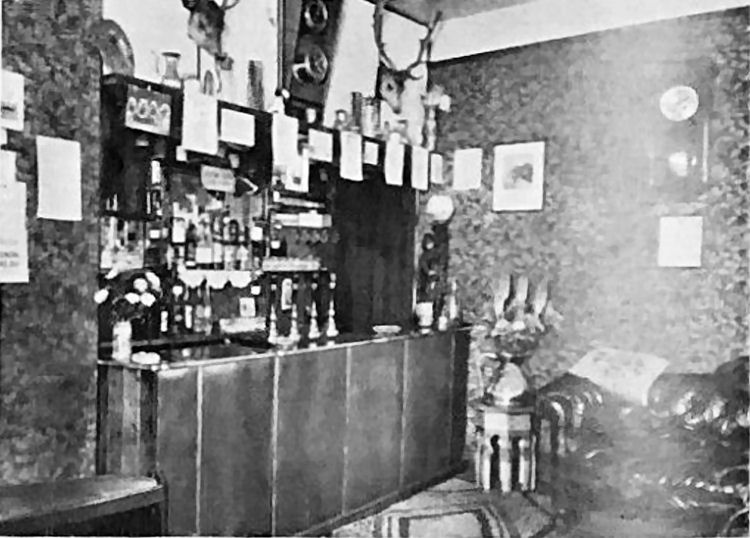|
Maidstone Road
Paddock Wood

Above postcard, date unknown. |

Above photo, date unknown proprietor is W J Kinnell. |

Above postcard, date unknown. |

Above photos showing the saloon bar 1947. Kindly sent by Rory Kehoe. |
The train station at Paddock Wood opened on 31 August 1842 and also
serves Brenchley which does not have a station of its own.
Dickens was a great lover of the Medway valley between Paddock Wood and
Maidstone, and he used Paddock Wood station as the starting point for trips
with friends he met from the train. It is known that the character, James
Carker, from the novel, Dombey and Son, (1846-8) was run over by a train at
Paddock Wood.
A branch line to Maidstone West opened in 1844 and the Maidstone Road Inn
had been built during its construction.
The Inn was later known as the Railway Hotel and in more modern times the
Hop Pocket.
Adapted from Laurence Gadd in The Dickensian.
Laurence Gadd writes of being stranded at Paddock Wood and as a result
securing a room upstairs at the Railway Hotel where there was a
communicating door to a second bedroom.
He fell asleep but awoke at dawn suddenly aware of changes in the room.
The bed was now an ancient four poster with chintz hangings and the
furniture antique.
In front of the communicating door there was a tall man with tight
fitting nankeen or pale yellow / buff trousers and dark clothes. The face
was a cadaverous colour with rows of glistening teeth and curled lips.
The door behind was still visible in every detail while they spoke.
The spectre told of arriving in 1848 from France and a journey from
Folkstone to Paddock Wood. His intention was to travel by the branch line to
a remote country village, possibly Yalding or any of the others, and his
gloomy message continued “it matters not, I never reached it”.
As morning approached the man became more restless saying “the time is
come it is my doom on this day to re enact the manner of my death”. He
needed to leave to be ready on the station platform.
“express comes through at four it don’t stop”
In the next moment the furniture reverted to the overnight appearance and
the author was alone while a blackbird sang a greeting for the new day.
There is some confusion over the original name and date of the first
building on this site.
The first reference to this as a business is in the 1891 local directory
where it is listed as the Railway Hotel however there is evidence that it
pre-dates the opening of the station in 1842 when it was
known as Maidstone Road Inn.
The 1843 Tithe Apportionment map for the area shows plot 38 as the Railway
Hotel and according to the 1868 Ordinance Survey Map it was known as the
Railway Inn but reverted back to the Railway Hotel in 1897. Jack Walker
(Beginnings & Bygones) describes the hotel as being used by people
travelling by road or rail, having its frontage on the Brandbridges
Turnpike. A further reference can be found in Bagshaw’s Gazetteer of 1847
under the name of the Maidstone Road Inn. This variation in name could well
be down to the fact that the station itself was originally called Maidstone
Halt and then changed to Paddock Wood in 1844.
It continued as the Railway Hotel until January 1944 when a German Junkers
88 was shot down by a night fighter. It crashed close to the hotel and the
resulting explosion destroyed the building. In 1955 a new building was
constructed on the same site, using the original cellars and was called the
Hop Pocket. Sadly in 2006 the business went into receivership and finally
closed in 2007 by which time it was known as the Hop Inn.
The building was later demolished and the site redeveloped.
I have found reference to a "Railway Hotel" addressed as Paddock Wood in
1919, when it was announced in the Sevenoaks Chronicle and Kentish
Advertiser or Friday 27 June 1919, that a Mr. and Mrs. Gregory, who used to
run the above named establishment had moved to the "Bull Hotel" in
Tonbridge. Further research identifies this as early as 1853.
However, I have also seen this same premises addressed as being in
Brenchley.
It is suggested and probably confirmed by the fact that John H Baldwin is
licensee of both that this pub is in fact the same as the "Maidstone
Road Inn."
In January 1944 the property was destroyed when a German Junkers 88
bomber was shot down and crashed in the area, causing a major explosion.
The pub was eventually rebuilt on the same site and reopened in 1955 this
time under the name of the "Hop
Pocket."
|
Southeastern Gazette, 18 January 1853.
Death my Drowning.
On Friday last, an inquest was held at the "Railway Inn," before W.
T. Neve, Esq., deputy coroner, to enquire as to the death of Wm.
Eagles.
Thomas Underwood deposed:— I am a porter at the Paddock Wood
station. On Wednesday last, the 12th inst., about twenty minutes
after eight o’clock in the evening, I went, as is my usual custom,
to shut the gate that crosses the road leading to the station, when
I heard a rustling in the hedge near the gate, and immediately
afterwards a splash in the water. I ran to the spot and turned my
light on, when I saw a man in the water; he cried loudly for help
and tried to get out; the water is from 4 to 5 feet deep in a space
from where the earth was excavated at the time the railway was laid
down; at some places it is 3 or 4 feet, while at others it is 8, 9,
and 10 feet deep. I called out for help, but before any one arrived
he was drowned. In struggling he got further out in the water, and
at the time I first saw him he was nearly a rod out in the water. It
was a very dark night and the water was very rough. With assistance
I got deceased out with ropes, and brought him to the stable of this
inn. I knew him. He was married, and a very sober, steady man. He
had been unwell with rheumatism, and was on our benefit club. The
road to the station was not his way from this house to his home; he
should have gone over the railway bridge on the other side of the
water. Two persons have been drowned in the same place before. There
was no other person with deceased. It was an hour and a half before
we succeeded in getting him out of the water.
John Fairman deposed:— I am ostler at this inn, and have known the
deceased as long as I can remember, he was in this house last
Wednesday evening, at about seven o’clock. I asked him how he was;
he replied he was bad with rheumatics, and was on the club, but
excepting that, he was very well he said he didn’t dare drink beer,
and asked me to get him 3d. of gin in a large glass, and to bring
him some warm water; he drank that and had a pipe. He then had
another glass of gin in warm water, and while he was drinking this I
went out to the stable. In about a quarter of an hour I returned,
when deceased had left the house. As I was returning I heard
Underdown calling for help, and I went and assisted in getting him
out. I was present when his pockets were searched. He had thirty
sovereigns and some silver in two purses.
Geo. Ellis, of East Peckliam, deposed:— I know the deceased very
intimately. Last Wednesday he came to my sister-in-law’s, in East
Peckham, by her request, to receive some money, and she gave him £80
in gold to keep for her. She said she was very ill, and she wished
him to have the money to pay her funeral expenses and to pay the
doctor. I never heard the deceased threaten to make off with
himself; he was a very steady, sober man, and not at all likely to
commit suicide.
The jury, after consulting for some time, returned a verdict of
"Accidentally drowned," at the same time recommending that as
several persons had been drowned in this piece of water, the railway
company be requested to put a more effectual fence around it, or
adopt some other means of preventing a recurrence of such accidents
in future.
|
|
Kent & Sussex Courier, Friday 3 October 1913.
Inquest Paddock Wood. Death in a train.
On Saturday evening last, at the Assembly Rooms, "Railway Hotel,"
Paddock Wood, Mr. Eric Clarke, Deputy
Coroner, held an inquiry respecting the death of Matilda Raffe, who
was found dead in the train at Paddock
Wood station on Friday evening last. Mr. W. J. Kinnell was chosen
Foreman of the Jury.
Henry James Raffe, 6, Salter Street, Limehouse, a dustman, in the
employ of the Stepney Borough Council,
identify deceased as his wife. She was about 53 years of age. He saw
her last on Tuesday, the 16th inst., when
she left London to go hop picking. She was quite well then, and had
never had a doctor; she had never
complained of illness, but occasionally suffered from shortness of
breath.
Mary Townley, 5, Brook Street, Poplar, said deceased was her mother.
Witnessed came down to Marden
hopfields the Sunday after her mother, and they had since been
living together, and working on Spitbrook
Farm. Her mother appeared to be quite well until Wednesday last,
when she said she did not feel very well. Her
feet were swollen and witness advised not to go to work, and she did
not go. On Thursday her breath was a bit
short, and on Friday her legs were so weak that she could not stand.
Deceased was conveyed in a cart from
Spitbrook Farm to the Railway Station. Witness got her into the
train and placed a bundle at the back of her
head. About 10 minutes after deceased asked her to put a shawl at
the back of her head, and she never spoke
again. Witness called a porter on their arrival at Paddock Wood, as
she thought her mother was in a fit.
Deceased ate very little since Wednesday, but she only complained of
shortness of breath. On those days she
did not work. On Wednesday she had a little brandy and milk.
Witnessed did not call a doctor, as she did not
think her mother was seriously ill, and deceased never asked to see
a doctor.
In reply to the Forman, witness said they left Marden station
between 4.50 and 5 p.m., and they were about 20
minutes get into Paddock Wood.
William James Gilbert, Hither Green, said he was a guard in the
employ of the S.E. & C. Railway, and helped to
load passengers at Marden. Seeing that this was not well, he
assisted the daughter in making her comfortable.
The train took 19 minutes to get from Marden to Paddock Wood. On
arrival at Paddock Wood he found the
woman was dead. The daughter called witness as he passed down the
train, who did not know what was really
the matter; neither did he at the time.
Dr. Simpson, in general practice at Brenchley, said he was summoned
to see the deceased in the absence of Dr.
Sealey, who was away from home. Witness arrived about 6:50 p.m..
Death had taken place apparently 2 or 3
hours before. The body was that of a stout woman. Swollen legs were
noticeable, but there was nothing
noticeable outwardly to indicate anything beyond natural causes of
death. In conjunction with Dr. Sealey they
had made a post-mortem examination, and found the heart considerably
enlarged and dilated, especially on the
right side. There was an abnormal amount of fat on the surface of
the heart, and a degenerative condition of
the mitral valve, and to a certain extent of the aorta; the liver
and kidneys were slightly enlarged, and the lungs
congested. They came to the conclusion that deceased died from heart
failure. The railway journey might have
slightly affected her, but in any case death would most likely have
taken place in a comparatively short time.
The jury returned a verdict of "Death from Natural Causes."
|
|
From Barclay, Perkins' Anchor Magazine. Volume XX, No. 4 - October 1947.
The "Railway Hotel," Paddock Wood.
In these post-war days of shortages, restrictions and austerity, it
is a tonic to meet
Mr H L Blundell, of the "Railway Hotel," Paddock Wood, for he will
soon convince
you that "things can be done" and difficulties overcome if one
possesses, as he
does, boundless enthusiasm and the will to attain a seemingly
unobtainable goal.
Serving as a Steward in the Royal Navy he was invalided out in 1930,
then followed
stewardship of the Knebworth Golf Club and the Bushey Hotel and Golf
Club. During
the War years he was engaged in essential work at Shorts Aircraft
Works at Rochester.
In March, 1945, he became tenant of the "Railway Hotel," which was
then what might
be described as an ordinary country "Pub" but the description was
not to fit it for long.
Not content with the Saloon possessing no Bar, Mr Blundell at once
proceeded to build
one himself and with the aid of a few stalwart customers produced a
modern bar in
attractive red and gold, thus giving a much-needed addition to the
room.
Adjoining the house was a disused British Restaurant and Mr Blundell
now turned his
energies in this direction. Although the House was doing catering on
a very small scale,
he visualised the day when the old Restaurant would become a smart
Dining Room, catering
for large numbers. This vision is now a reality: almost
unrecognisable, the Restaurant
has been transformed into an attractive and comfortable Dining Room,
catering for an
average of 100 diners a day. Catering for Masonic functions, wedding
receptions etc is
now a regular feature of the service of the "Railway Hotel" and has
provided a long-needed
facility for these affairs in Paddock Wood.
"Operation Garden" was the next major event and a large lawn very
soon took the place
of a maze of saplings and brambles. Furnished as it is now with
rustic furniture and gay
borders of flowers, it takes a well-merited place in the general
scheme to put the "Railway
Hotel" on the map. The large kitchen garden was meanwhile making the
Dining Room
self-supporting for vegetables and fruit.
The popularity of the "Railway Hotel" attracted the BBC to make
recordings on two occasions
during last season's hop-picking season, at which time Mr Blundell
is called upon to dispense
liquid and solid refreshment to hundreds of hop-pickers, a no mean
task in these days of
quotas and short supplies.
If you are in Paddock Wood at Christmas time, you are likely to hear
a well-trained choir of
voices rendering "Noel" or some other Christmas carol, this will be
Mr Blundell and his
customers singing once again on behalf of Kent's Blind. This entails
rehearsals and much work
but the reward of having created a record in subscribing £80 to this
Charity by their efforts
last Christmas was sufficient recompense for their vocal labour and
they are looking forward
to an even greater amount this year.
Mr Blundell has many more schemes in his fertile imagination and we
can only say "good luck"
to this enterprising and go ahead tenant. |
LICENSEE LIST
BALDWIN J H 1890-91+ (age 33 in 1891 ) )

KINNELL W J ????
CHURCHILL Thomas Godwin 1911+ (age 28 in 1911 ) )
GREGORY Mr & Mrs to 1919


BLUNDELL H L Mr Mar/1945+
https://pubwiki.co.uk/RailwayHotel.shtml
 Sevenoaks Chronicle and Kentish Advertiser Sevenoaks Chronicle and Kentish Advertiser
 Maidstone
and Kentish Journal Maidstone
and Kentish Journal
|



